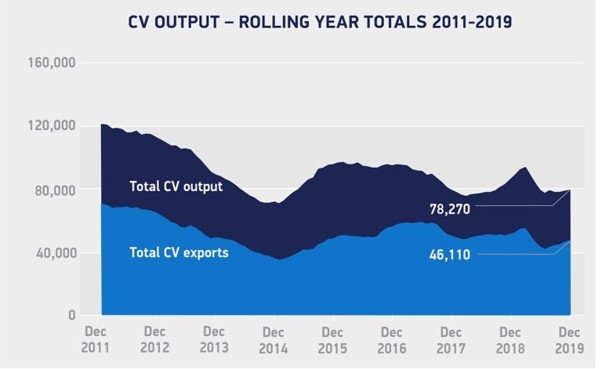UK CV manufacturing falls 7.8% in 2019

03 February 2020
UK CV manufacturing falls 7.8% in
2019
The UK commercial vehicle manufacturing sector fell
by 7.8% in 2019, according to new figures, with model changeovers, variable
fleet buying patterns and regulatory issues blamed for the decline.
In all, 78,270 were produced in 2019, compared to
84,888 in 2018, according to figures released by the Society of Motor
Manufacturers and Traders (SMMT).
The biggest drop in production was for the export
market, which fell by 8.4% to 46,110 units. This equates to 59.6% of all vans,
trucks, taxis and buses built in the UK in 2019 being sent for export – with
94.6% going to the EU. Overall, British-built CVs were shipped to at least 57
different countries globally, including 619 units to Israel, 299 to Australia
and 168 to Hong Kong.
Meanwhile the UK market declined by 7.0% in the year,
with 2,408 fewer UK-built CVs joining British roads.
Over the course of 2019, several issues affected CV
buying, including two anticipated Brexit deadlines, the introduction of
mandatory smart tachographs in trucks in June and the introduction of the
Worldwide Harmonised Light Vehicle Test Procedure at the beginning of
September.

However, despite the overall decline over 2019, new
model production was up in December. CV output rose 8.7%, which was largely
driven by manufacturing for export, which rose by 30.5%. Meanwhile, continuing
the trend seen in recent months, production for the home market declined by
18.6%.
Mike Hawes, SMMT chief executive, said: “2019 was a
turbulent year for British commercial vehicle production, with key model
changeovers and some regulatory issues contributing to the falling output. With
model changeovers now complete, we expect to see CV output bounce back this
year, however, this is reliant on political and economic stability that
supports domestic demand.
“Given exports still account for the majority of UK
output, with nine in ten vehicles shipped overseas destined for the EU, we need
a trading relationship with Europe that protects this vital pillar of UK
manufacturing, and this means a tariff-free trade agreement that puts
automotive at its centre.”
(Article originally published on https://thetruckexpert.co.uk/ )